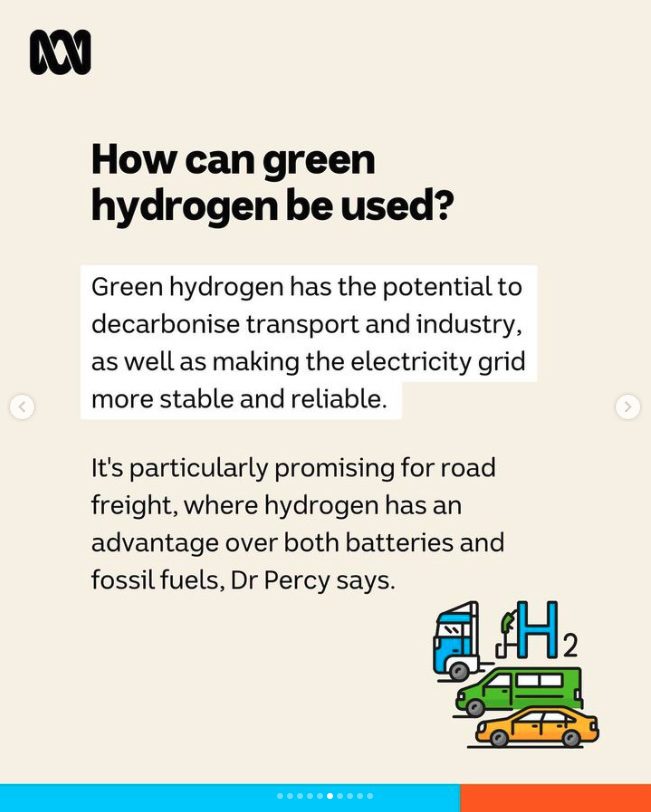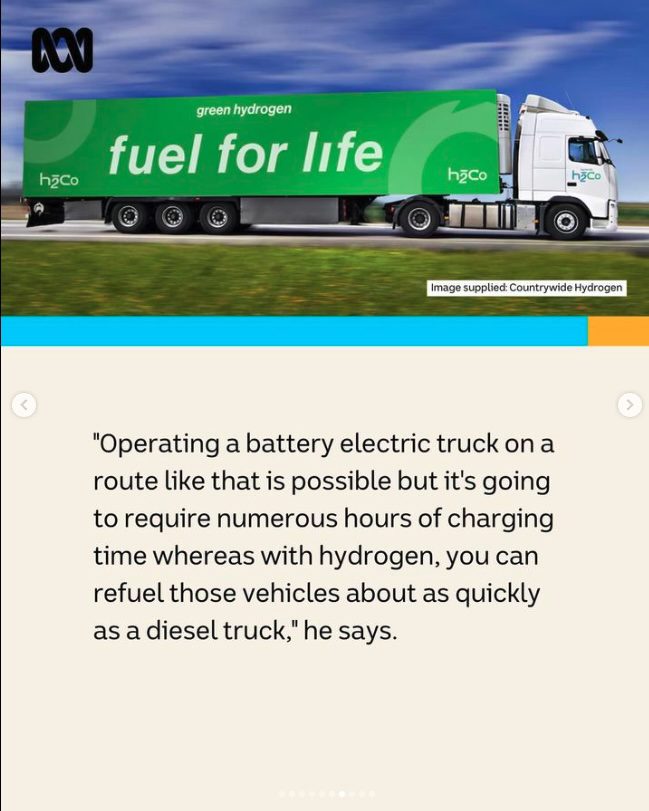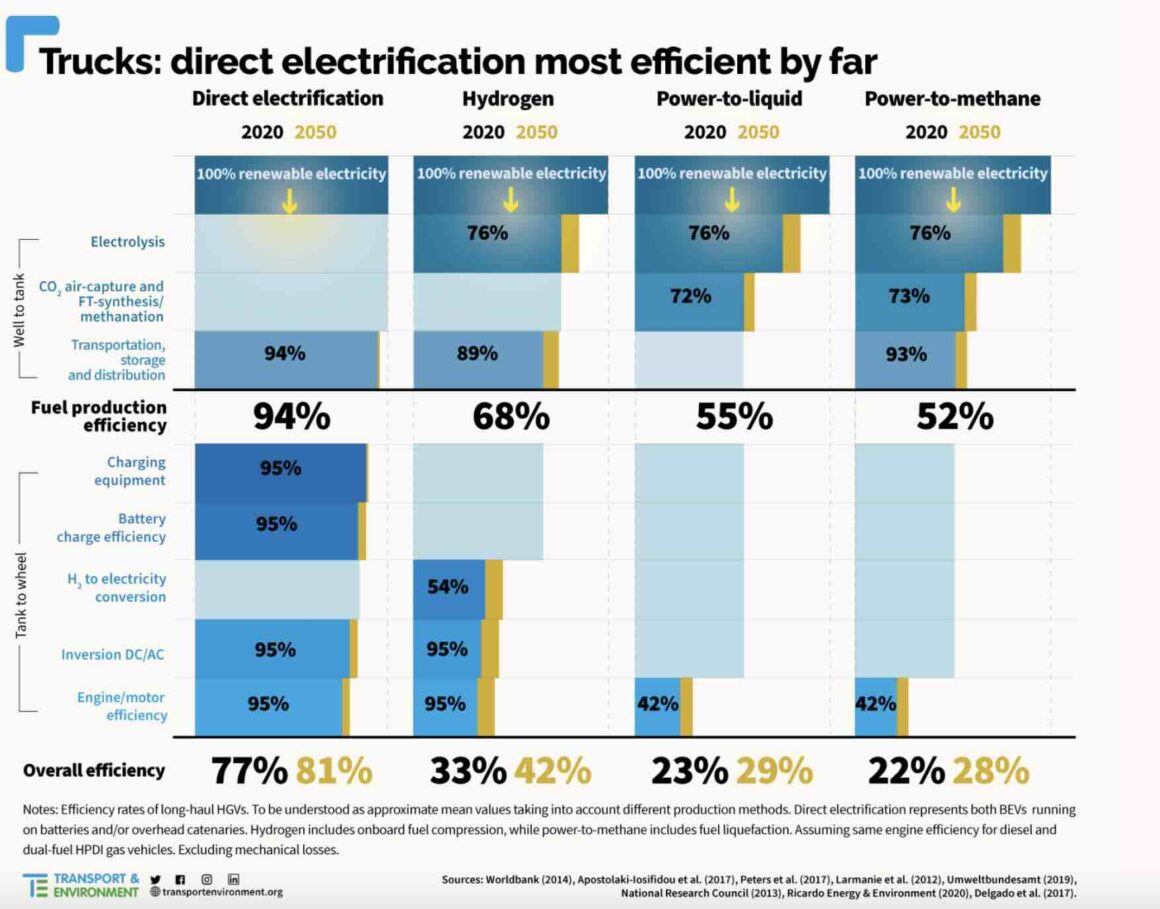It’s April 2024 and some of Australia’s fossil fuel majors are still touting hydrogen powered vehicles as a solution for decarbonising transport.
In an article published this week, the ABC quoted Dr Steven Percy, a senior research fellow at the Victorian Hydrogen Hub, who says green hydrogen has the potential to decarbonise transport.
“It’s particularly promising for road freight, where hydrogen has an advantage over both batteries and fossil fuels.” says the ABC, quoting Dr Percy.
The article by ABC journalist Jessica Black was accompanied by social media tiles on Instagram parroting the claim that hydrogen has an advantage over batteries showing a H2 graphic alongside a truck, a van and a passenger car.

“Operating a battery electric truck on a route like that is possible but it’s going to require numerous hours of charging time whereas with hydrogen, you can refuel those vehicles about as quickly as a diesel truck,” says Percy.

Victorian Hydrogen Hub in collaboration with oil and gas companies
According to its website, the Victorian Hydrogen Hub is a partnership between CSIRO and Germany’s ARENA2036 factory.
“The Victorian Hydrogen Hub (VH2) brings together researchers, industry partners and business to drive the implementation of the hydrogen economy.” states the organisation’s website.
However, scroll further down the page and petrol and diesel distributer Ampol as well as the Australian Gas Infrastructure Group are listed as VHH collaborators.

The Driven spoke to the Victorian Hydrogen Hub to seek clarification on the research behind the claims made in the ABC story.
VHH chief scientist Professor Virginia Kilborn confirmed that in addition to funding from the Victorian government’s Victorian Higher Education State Investment Fund, VHH also receives funding from its industry partners such as Ampol.
Hydrogen transport claim not actually supported up by VHH research
The Driven asked VHH about the research behind Dr Percy’s claim that hydrogen has an advantage over battery electric transport. Dr Percy was not available for comment, however VHH put The Driven in contact with Associate Professor Hadi Ghaderi, who is also listed on the VHH team, to answer our questions regarding the ABC article.
“There’s no real world Australian field trials and that’s an issue.” sad Professor Ghaderi.
“From a modelling perspective, when we look at some of the charging refuelling times there could be some advantage in terms of operationally.”
The Driven asked if the claim was based solely on the metric of charging/fuelling time rather than other factors such as thermodynamic inefficiencies associated with hydrogen, which result in 80% energy losses as well as incredible complexity in hydrogen supply chains compared to electricity.
“To be fair, we need to have both technologies against each other in real world condition and test for this, but both range and charging refuelling time are factors that will influence the comparative advantage of these technologies,” he says.
Battery electric trucks are already beyond real world trials and are in commercial operation. They are also far superior to hydrogen trucks on range and charging time. For example Tesla’s Semi truck is already operational and has a range of 500 miles (804 km) when fully loaded with 82,000 pounds (37 tonnes) and can charge 70% (562 km) in just 30 mins.
The Australian standard hours of service rule states that a driver must take a mandatory 15 minute break prior to the completion of 5.5 hours of continuous work and a mandatory 30 minute break in blocks of at least 15 continuous minutes prior to the completion of 8 hours of continuous work.
This effectively means that based on Tesla’s Semi’s range and charging speed, charging times wouldn’t be long enough to satisfy mandatory truck break time requirements.
The Driven asked professor Ghaderi if in addition to range and charging time, their research also looked at the availability and cost of hydrogen compared to electricity.
“Absolutely, currently the numbers don’t make sense at all. The numbers we see $2 or $3, they’re not realistic at all. So definitely, from an infrastructure point of view, hydrogen will have a higher total cost.”
“But generally speaking, the work we’ve done, we don’t have a truck in front of us it’s just some modelling work. Basically we still don’t have the full results at the moment.”
The Driven then asked Professor Ghaderi if VHH doesn’t have the full results, why are they being quoted in the ABC story as saying hydrogen has an advantage over battery electric. Professor Ghaderi said he disagreed with his VHH colleague.
“In my view, the hydrogen infrastructure is far far more complex than a battery charging system. Definitely far far more complex. There are other technical issues. And that is why we’re seeing the battery electric trucks on the road, at least in the urban freight and short distance activities.”

Any number of studies have pointed to the dramatic efficiency advantage of electric trucks over hydrogen, which are about the same advantage that electric trucks and cars have over petrol and diesel machines. This one above from Transport and Environment is one of the more generous to hydrogen. Many studies suggest an efficiency of 25 per cent.
Hydrogen transport misinformation confusing the public about the transition
In 2024, suggesting hydrogen has an advantage over battery electric vehicles is like suggesting cassette tapes have an advantage over Spotify.
Some believe that hydrogen has been pushed by companies like Toyota to confuse the public about the future of transport therefore allowing them to sell highly polluting fossil fuel powered cars for longer.
There also been a push from gas companies who are desperate to protect their monopolies over energy, something they won’t be able to do in a future of decentralised renewables and electric vehicles.
If it feels like hydrogen for cars has been talked about for decades, that’s because it has.
A Guardian article from 2011 titled “Why don’t governments push for more hydrogen cars?” begins with the sentence “We seem to have been talking about the ‘hydrogen economy’ for well over a decade now, but, like so many other saviour technologies, its arrival never seems to get any closer.”
The never ending narrative of “we’re developing hydrogen-powered cars” that stretches out into the future, suits legacy auto companies who are unable or unwilling to develop electric vehicles.
They tell their customers this vague technology will be ready in a few years. In the meantime please consider our petrol and diesel cars.
For a full debunking of why hydrogen has no future in any form of road transport see The madness of Big Auto’s push for hydrogen-powered cars

Daniel Bleakley is a clean technology researcher and advocate with a background in engineering and business. He has a strong interest in electric vehicles, renewable energy, manufacturing and public policy.


